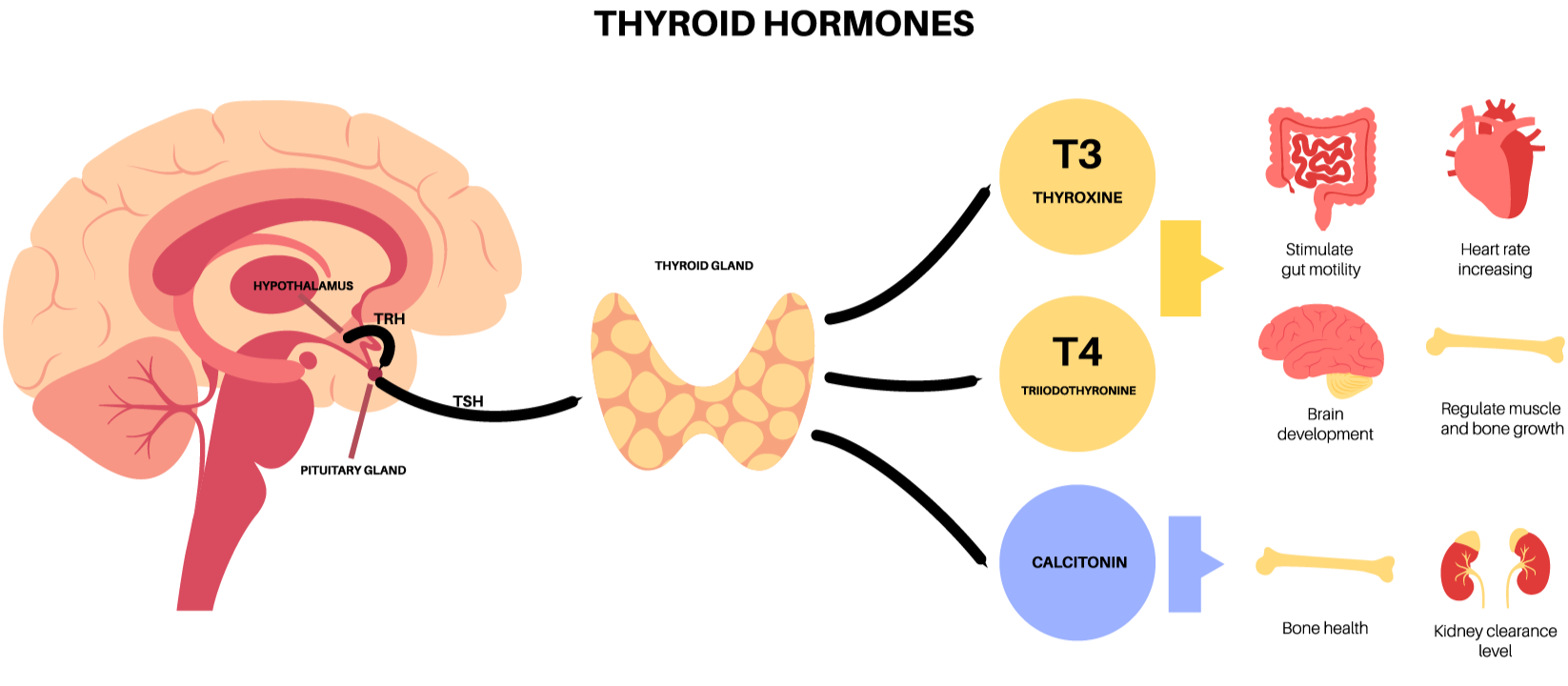Understanding Thyroid Hormones: Functions and Imbalances
The thyroid gland affects growth, metabolism, fertility and more by producing and secreting crucial hormones, including thyroxine (T4) and triiodothyronine (T3).1,2 Medix Biochemica has decades of experience in producing premium-quality monoclonal antibodies and other raw materials for use in the detection of thyroid hormones.3
What Makes the Thyroid Important?
The Role of the Thyroid
The thyroid gland produces hormones that induce effects on practically all nucleated cells in the human body, typically increasing their function and metabolism.1b
Physiological functions affected by thyroid hormones include:
- Boosting the body’s basic energy usage (the basal metabolic rate)1
- The breakdown of fats (lipolysis) or the storage of fats (lipid synthesis), depending on the body’s metabolic status1
- The metabolism of carbohydrates1
- The growth (anabolism) or breakdown (catabolism) of proteins1
- Enabling the hormones produced by the adrenal glands (catecholamines) to act1
- Acting with growth hormone to stimulate bone growth in children1
- Helping with brain development during the prenatal period1
- Affecting mood in adults1
- Affecting fertility, ovulation and menstruation1
- Regulating heart rate and how much blood the heart pumps through the circulatory system (cardiac output)2
- Regulating how food moves through the digestive system (gastrointestinal motility)2
Functions of T3 and T4 Hormones
The thyroid gland works with the anterior pituitary gland and the hypothalamus of the brain, creating a self-regulatory circuit called the hypothalamic-pituitary-thyroid axis.1
The hypothalamus releases thyrotropin-releasing hormone (TRH) to the anterior pituitary gland.1 This TRH stimulates the anterior pituitary to release thyroid-stimulating hormone (TSH).1
TSH is released into the blood and binds to the thyroid-stimulating hormone receptor (TSH-R) on the thyroid follicular cell.1 This triggers a series of signals that regulate the thyroid gland’s function.1
T3 and T4, produced by the thyroid gland, promote brain development, bone growth, gut motility and a healthy heart rate.1,2 Calcitonin, another important hormone produced by the thyroid gland, inhibits cells that break down bone and controls how much calcium the kidneys reabsorb and release into the bloodstream.2b

Common Thyroid Hormone Imbalances
When the thyroid gland isn’t functioning properly, it can cause serious health problems.4-11
Hyperthyroidism
Hyperthyroidism (overactive thyroid) is a condition where the thyroid gland produces and releases excess T3 and T4 hormones.1,4
Symptoms of hyperthyroidism1
- Weight loss (despite increased appetite)
- Weakness and fatigue
- Heart palpitations
- Heat intolerance and increased sweating
- Hypertension
- Anxiety, restlessness and emotional instability
Testing for hyperthyroidism5
- Healthcare practitioners will use a blood test known as a thyroid function test to check a patient’s thyroid hormone levels. The thyroid function test determines the levels of T3, T4 and TSH in the blood. High T3/T4 and low TSH typically indicate hyperthyroidism.
- A further blood test may be done to detect anti-thyroid antibodies, which are usually found in the case of Graves’ disease.
- An erythrocyte sedimentation rate (ESR) blood test may also be done to check for inflammation in the body, which is a symptom of thyroid inflammation (thyroiditis).
- A thyroid scan can be used to check for visual abnormalities like nodules on the thyroid.
Treating hyperthyroidism
An overactive thyroid may be treated with medications known as thionamides, radioactive iodine therapy or surgery to remove part or all of the thyroid gland.6 A patient will need lifelong hormone replacement therapy after thyroid removal surgery.2
Graves’ disease
Graves’ disease is an autoimmune condition where the immune system attacks the thyroid, causing it to produce more hormones than the body needs.7 It’s the most common cause of hyperthyroidism.1
Hypothyroidism
Hypothyroidism (underactive thyroid) is a condition where the thyroid gland doesn’t produce enough T3 and T4 hormones.1,8
Symptoms of hypothyroidism1
- Weight gain (despite poor appetite)
- Fatigue
- Slow heart rate
- Cold intolerance
- Hair loss
- Constipation
- Hypertension
- Depression
- Impaired concentration
Testing for hypothyroidism9
- A thyroid function test is used to determine the levels of T4 and TSH in the blood. Low T4 and high TSH may indicate hypothyroidism.
- A thyroid antibody test may be used to detect or rule out autoimmune conditions like Hashimoto's thyroiditis.
Treating hypothyroidism10
An underactive thyroid can be treated with daily hormone replacement medication.
Hashimoto’s thyroiditis
Hashimoto’s thyroiditis is a common cause of hypothyroidism.1 It’s an autoimmune condition that causes the immune system to attack the thyroid gland, damaging and inflaming it.11 As the thyroid is damaged over time, it can no longer produce enough hormones to function properly.11 This causes underactive thyroid symptoms.11 Hashimoto’s may also cause a goiter (lump) in the throat.11
Key Thyroid Hormones and Their Functions
Thyroxine (T4)3
Most of the T4 secreted by the thyroid binds to three major serum transport proteins: thyroxine-binding globulin (TBG), transthyretin and human serum albumin. Only a very small amount of T4 is ‘free’ in the bloodstream.
T4 binds to the nuclear thyroid hormone receptor (TR), which is involved in regulating all intermediary metabolic processes of carbohydrates, lipids and proteins. T3, the more metabolically active thyroid hormone, can also be produced from T4.
Medix Biochemica offers raw materials, including antibodies and antigen conjugates, for T4 measurement.
Triiodothyronine (T3)3
As the more metabolically active thyroid hormone, T3 plays a critical role in metabolic rate, heart function, muscle control and brain function.
Medix Biochemica offers an antibody and antigen conjugates which can be used to develop immunoassays for detecting T3.
Thyroid stimulating hormone (TSH)3
TSH (also known as thyrotropin) from the anterior pituitary gland causes the thyroid to secrete T4, which is converted into T3 in the liver and other organs. This is why TSH is needed to regulate the normal development and metabolism of the body.
Levels of serum TSH are often used to diagnose and manage thyroid disorders like hyperthyroidism and hypothyroidism. Because TSH levels in the body often change before the levels of other thyroid hormones do, high or low TSH is typically a good early indicator for thyroid problems.
Medix Biochemica has been a leading provider of monoclonal antibodies recognizing human TSH for more than 35 years. We offer a wide selection of mouse monoclonal antibodies against both the alpha subunit and the full human TSH, as well as antigens.
Thyroglobulin3
Thyroglobulin is the predominant protein produced by the thyroid gland, and acts as a substrate for the synthesis of T3 and T4. It also acts as a storage protein for iodide, ensuring its sufficiency.
Thyroglobulin is produced by thyroid cancer cells as well as normal thyroid cells. It’s not suitable as a diagnostic cancer biomarker, but it can be used to monitor the treatment of cancer patients who’ve had thyroid removal surgery.
Elevated blood thyroglobulin levels can also be an indicator of Graves’ disease.
Medix Biochemica’s thyroglobulin product offering contains several anti-thyroglobulin monoclonal antibodies and a native antigen.
Calcitonin
Calcitonin opposes the actions of the parathyroid hormone, which increases blood calcium levels.2b
Medix Biochemica’s range of antibodies used for assessing thyroid health includes calcitonin antibodies.3
Partnering With Medix Biochemica
Medix Biochemica is an industry-leading provider of raw materials for use in in vitro diagnostics (IVD) testing such as blood tests.12 We focus on building lasting partnerships with our IVD clients, with optimized industrial-scale production methods, certified batch-to-batch consistency and exceptional customer service.3,12
References:
- Shahid MA, Ashraf MA, Sharma S. Physiology, thyroid hormone. StatPearls Publishing; 2023. Accessed September 4, 2023. http://www.ncbi.nlm.nih.gov/books/NBK500006/.
1b. Armstrong M, Asuka E, Fingeret A. Physiology, thyroid function. StatPearls Publishing; 2023. Accessed September 6, 2023. http://www.ncbi.nlm.nih.gov/books/NBK537039/. - Thyroid: what it is, function & problems. Cleveland Clinic. Accessed September 4, 2023. https://my.clevelandclinic.org/health/body/23188-thyroid.
2b. Calcitonin: what it is, function & side effects. Cleveland Clinic. Accessed September 6, 2023. https://my.clevelandclinic.org/health/articles/22330-calcitonin. -
Technical note: hormones - thyroid. Medix Biochemica. June 2023.
-
Hyperthyroidism: symptoms, causes, treatment & medication. Cleveland Clinic. Accessed September 4, 2023. https://my.clevelandclinic.org/health/diseases/14129-hyperthyroidism.
-
Overactive thyroid (hyperthyroidism) - diagnosis. NHS. Accessed September 4, 2023. https://www.nhs.uk/conditions/overactive-thyroid-hyperthyroidism/diagnosis/.
-
Overactive thyroid (hyperthyroidism) - treatment. NHS. Accessed September 4, 2023. https://www.nhs.uk/conditions/overactive-thyroid-hyperthyroidism/treatment/.
-
Graves’ disease. NIDDK. Accessed September 4, 2023. https://www.niddk.nih.gov/health-information/endocrine-diseases/graves-disease.
-
Hypothyroidism: symptoms, causes, treatment & medication. Cleveland Clinic. Accessed September 4, 2023. https://my.clevelandclinic.org/health/diseases/12120-hypothyroidism.
-
Underactive thyroid (hypothyroidism) - diagnosis. NHS. Accessed September 4, 2023. https://www.nhs.uk/conditions/underactive-thyroid-hypothyroidism/diagnosis/.
-
Underactive thyroid (hypothyroidism) - treatment. NHS. Accessed September 4, 2023. https://www.nhs.uk/conditions/underactive-thyroid-hypothyroidism/treatment/.
-
Thyroiditis. NHS. Accessed September 4, 2023. https://www.nhs.uk/conditions/thyroiditis/.
-
About us. Medix Biochemica. Accessed September 4, 2023. https://about.medixbiochemica.com/.





